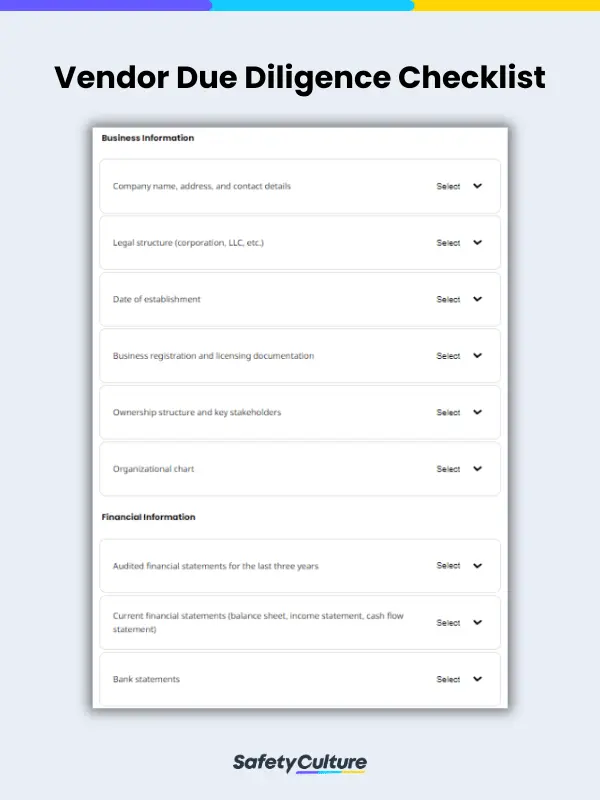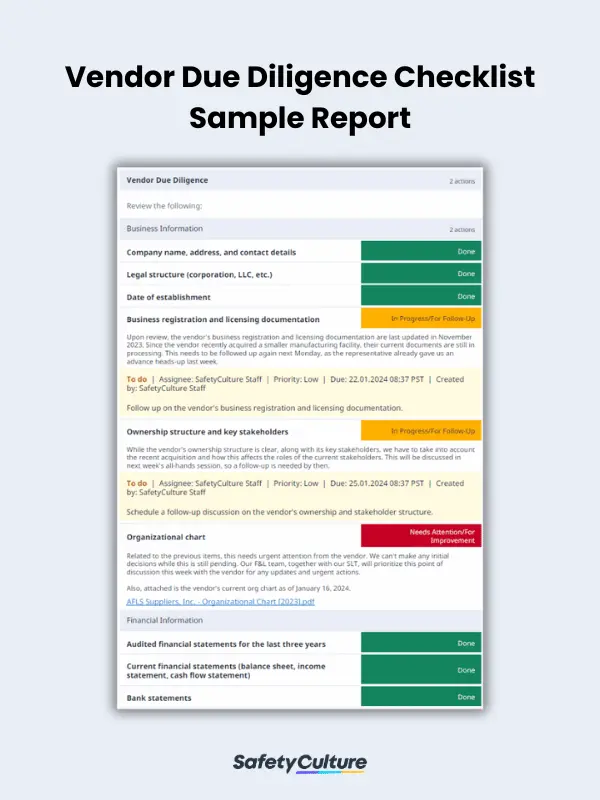What is a Vendor Due Diligence Checklist?
A vendor due diligence checklist is a comprehensive tool used by organizations to systematically assess and gather essential information about a potential vendor before entering into a business relationship. The checklist helps them evaluate various aspects of the vendor’s operations, financial health, compliance, and other key factors that may impact the success and stability of the partnership. In turn, it ensures transparency, risk mitigation, and informed decision-making during the vendor selection process.
Importance of Using a Checklist When Assessing Vendors
In complex business environments where vendors play a crucial role in supply chains and service delivery, a checklist serves as a practical tool to standardize the due diligence process. It also ensures that all key information is thoroughly examined, helping organizations make informed decisions and mitigate risks effectively.
Another benefit of using a vendor management due diligence checklist is the assurance of compliance with relevant standards and regulations. Different industries have specific requirements and legal frameworks that vendors must adhere to. For instance, the following standards and regulations apply to certain industries:
- Vendors handling sensitive data need to comply with data protection laws such as the General Data Protection Regulation (GDPR) in the European Union or the Health Insurance Portability and Accountability Act (HIPAA) in the United States. For these cases, vendor due diligence checklists may include items to assess a vendor’s data security measures and adherence to privacy regulations.
- Some industries, like the pharmaceutical industry, may have stringent requirements related to quality control and product safety. Checklists in such industries will reflect these specific regulations to ensure vendor compliance.
- Vendor due diligence checklists used by organizations in industries that comply with environmental requirements may include items related to the vendor’s environmental practices.
Lastly, a checklist promotes consistency and thoroughness in the vendor or supplier selection process. It helps stakeholders follow a standardized set of criteria, reducing the likelihood of overlooking key considerations. This consistency is particularly valuable when dealing with a high volume of vendors or when multiple teams within an organization are involved in the evaluation process.
What to Include in a Vendor Due Diligence Checklist
A comprehensive third-party vendor due diligence checklist should touch on various aspects of a potential vendor’s business to ensure a thorough assessment. Generally, the following key elements must be covered in this checklist:
- Title Page
- Business Information
- Financial Information
- Regulatory Compliance
- Contracts and Agreements
- Intellectual Property
- Operations and Technology
- Employee and Labor Relations
- Insurance Coverage
- Supply Chain Management
- Environmental and Social Responsibility
- Cybersecurity
- Due Diligence on Subcontractors
- Business Continuity and Disaster Recovery
- Corporate Social Responsibility (CSR)
- Health and Safety
- Completion Page
How to Create and Use One
Creating and using a vendor due diligence checklist involves a structured approach to assess potential vendors thoroughly. Here are the steps to follow:
- Familiarize yourself with industry-specific standards and regulations that may impact vendor due diligence, and align the checklist with relevant legal and compliance requirements.
- Engage with relevant stakeholders, including legal, finance, and procurement teams, to gather insights on critical areas that should be included in the checklist.
- Divide aspects into logical sections based on identified risk areas to help organize the checklist. Within each section, list specific items or questions that need to be addressed or reviewed.
- Acknowledge that the checklist may need customization based on the specific vendor and the type of goods or services they provide. Before conducting the assessment, finalize the items included.
- Brief the team responsible for conducting due diligence on the purpose and structure of the checklist.
- Collect and verify the required documentation from the vendor, ensuring it aligns with the checklist items.
- Systematically assess each item based on the documentation and responses from the vendor and analyze the findings.
- Collaborate with relevant stakeholders, such as legal, finance, and procurement teams, to discuss findings and implications.
- Communicate any identified issues or areas of concern to the vendor and seek clarification or additional information as necessary.
- Develop risk mitigation strategies based on the identified risks by working with the vendor to implement corrective actions or negotiate terms.
- Prepare a comprehensive report summarizing the due diligence results, findings, and actions taken.
- Utilize the due diligence report to inform decision-making regarding the engagement with the vendor.
- Continuously update the checklist based on changes in regulations, industry standards, or organizational needs.
Vendor Due Diligence Checklist Example
Using practical examples as guides can help you gain insights into how a structured vendor due diligence process can enhance transparency, mitigate risks, and improve decision-making in forming successful and secure business partnerships.
To help you visualize what a filled-out vendor due diligence checklist looks like, here’s a sample report for your reference:
FAQs About Vendor Due Diligence Checklists
Yes, a vendor due diligence checklist can and should be tailored-fit as the nature of risks, compliance requirements, and critical evaluation criteria vary significantly across industries. This allows organizations to address sector-specific nuances, ensuring that the checklist is relevant to the unique challenges and standards of each industry.
Supply chain management is a critical component of a vendor due diligence checklist because it directly impacts a vendor’s ability to fulfill commitments reliably. Assessing the supply chain ensures that potential risks associated with dependencies on specific suppliers, potential supply chain disruptions, and overall operational resilience are thoroughly examined.
A vendor due diligence checklist prompts a thorough examination of various facets that allows organizations to proactively assess the level of risk involved in a vendor relationship. This comprehensive risk assessment also lets them negotiate terms and implement risk mitigation strategies before entering into agreements.




